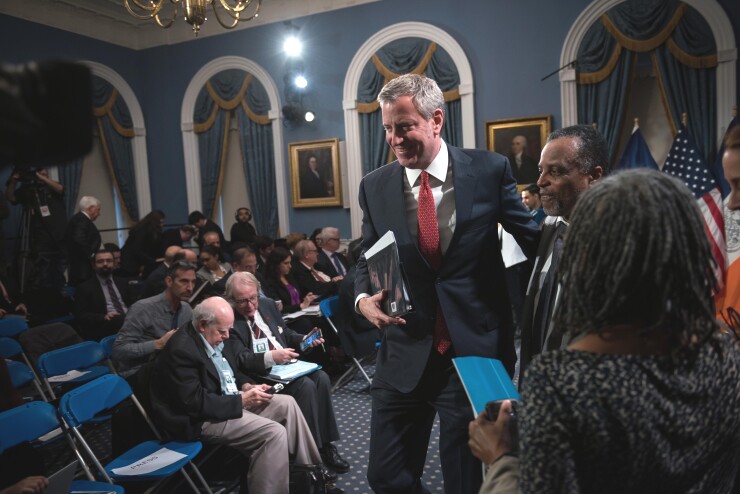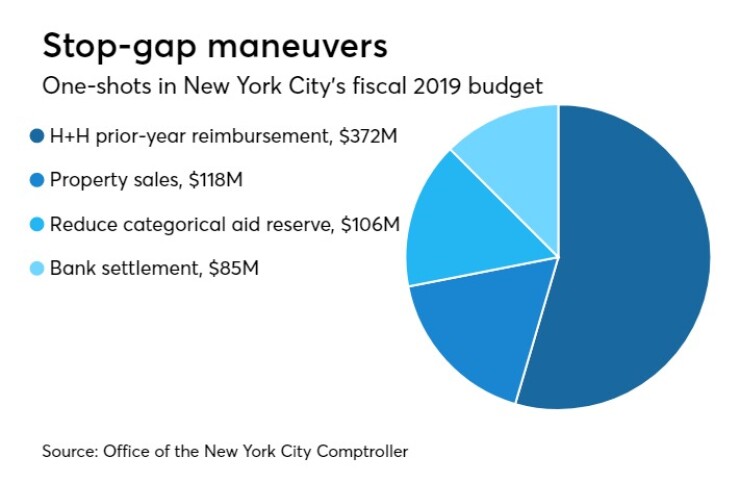Moody's Investors Service upgraded New York City’s general obligation bonds to Aa1 from Aa2 Friday.
Moody’s said the upgrade, which affects about $38 billion of GO debt, “reflects continued strengthening and diversification of New York City's economy, reducing its reliance on volatile financial services. The city's competitive advantages include a young and highly skilled labor pool, access to higher education and medical centers, strong domestic and international transportation links, and low crime rates.”

Moody’s said this puts the city in a position to see strong future growth, especially in media, medical research, and technology, while keeping its strengths in financial services.
“For the last five years, we’ve used the city’s budget to improve the lives of New Yorkers,” said Mayor Bill de Blasio. “Moody’s credit rating is validation of what we’ve always known: that you can be both a progressive and a strong fiscal manager.”
Moody’s said the upgrade “also reflects the city's ongoing strong financial management, including stronger reserves that position it better to withstand an economic downturn. Budgetary and financial management are strong and frequent updates to multi-year financial plans provide the city a transparent view of future budget pressures New York City's revenue base is large and diverse.”
Moody’s said that because the city’s financing responsibilities are broader than most local governments, its debt burden is above-average due to this operational scope.
“Still, the city's fixed costs for debt service, pensions and retiree health care have decreased and are now below the median for the largest local governments and in the bottom five among the nation's largest cities,” Moody’s said.
“Moody’s upgrade seems to underscore the finding from our December fiscal outlook report that despite a slowing economy the city’s fiscal condition would remain positive for the near-term,” said Doug Turetsky, the New York City Independent Budget Office’s chief of staff.
Moody’s also raised the city's outstanding appropriation-backed debt to Aa2 from Aa3, including $2.7 billion of senior and second indenture revenue bonds issued through the Hudson Yards Infrastructure Corp.; $680 million of bonds issued through the New York City Health and Hospitals Corp.; $223 million of bonds issued through the New York City Educational Construction Fund; and $77 million of bonds issued through the New York City Industrial Development Agency.
"I think the timing is a little strange since, in my mind, the city is facing some unique challenges," said Howard Cure, director of municipal bond research at Evercore Wealth management.
"The city has continued to increase employee levels and associated fixed costs such as pensions and OPEBs," Cure said. "There also is some concern over whether reserve levels are large enough to cope with the next recession, although the economy is diversifying. They had Amazon withdraw its offer of 25,000 jobs, which seems to be a major immediate loss with a larger concern about being able to persuade large businesses to relocate. The city also faces some very large capital expenditures stemming from the public housing system and their share of MTA improvements."
City Comptroller Scott Stringer said the city should remain fiscally cautious.
“I am thrilled with Moody’s vote of confidence in New York City’s economy. A higher bond rating means lower borrowing costs for the city," Stringer said.

"That said, maintaining the city’s fiscal strength is a full-time job, so while we celebrate today’s good news, we at the Comptroller’s Office remain doubly committed to continuing our progress through careful oversight of the city’s budget and economy.”
In his
“Our budget needs to be balanced for the long term, not just for the next year, so that we can ensure that vital initiatives and services for families and seniors go uninterrupted regardless of the broader economy," he said. "To reach that goal we need to build up our budget cushion and conduct a more rigorous review of agency spending to root out inefficiencies and waste.”
Stringer added the budget revealed a lack of financial preparedness for potential future economic uncertainty and an absence of tangible results despite record spending at three city agencies.
Cure said there were also other forces affecting the city's economic health.
"From a federal perspective, there seems to be an anti-New York or blue state sentiment with potential cuts in areas such as public housing and healthcare with the city still struggling with its Health and Hospitals Corp. although finances have improved in that area as well. Also, if the state has a problem balancing its budget, and there are some concerns about recent revenue projections, there could be cuts to state aid for the city in areas such as education," he said.
The city's GOs are rated AA by S&P Global Ratings and Fitch Ratings.





